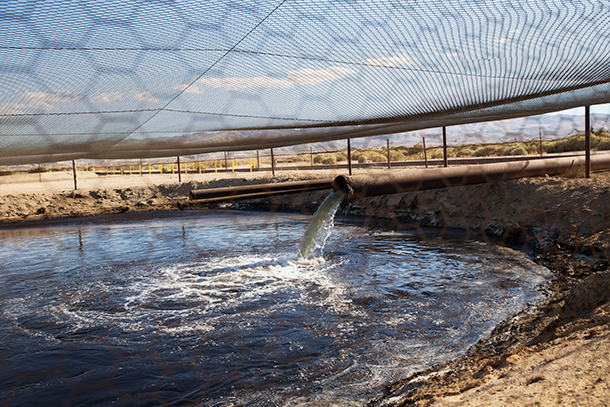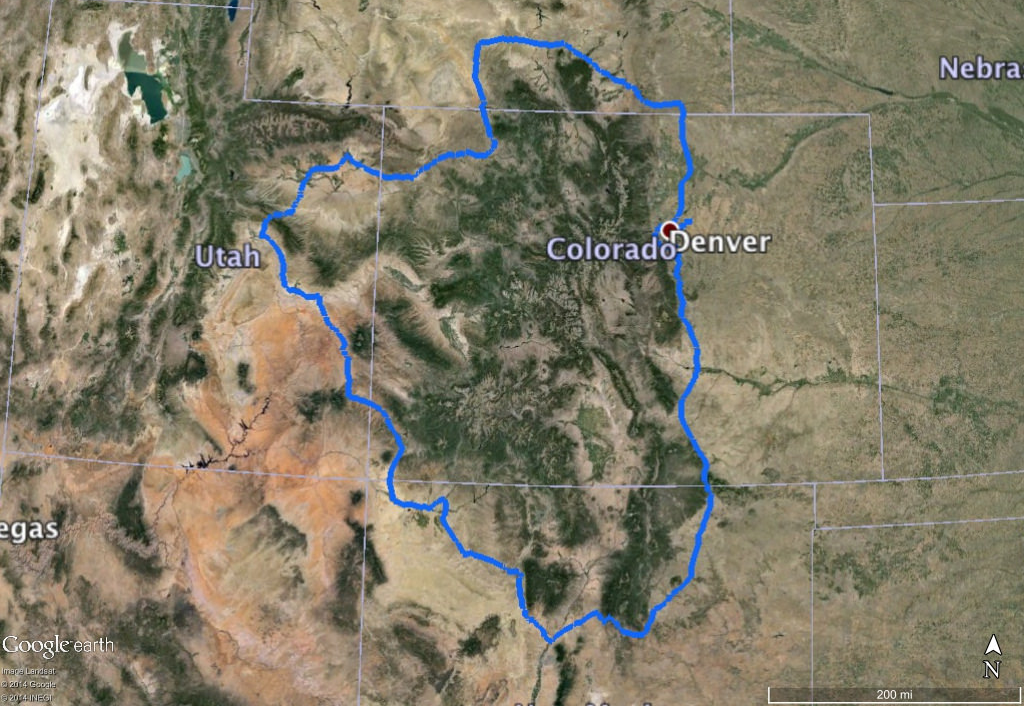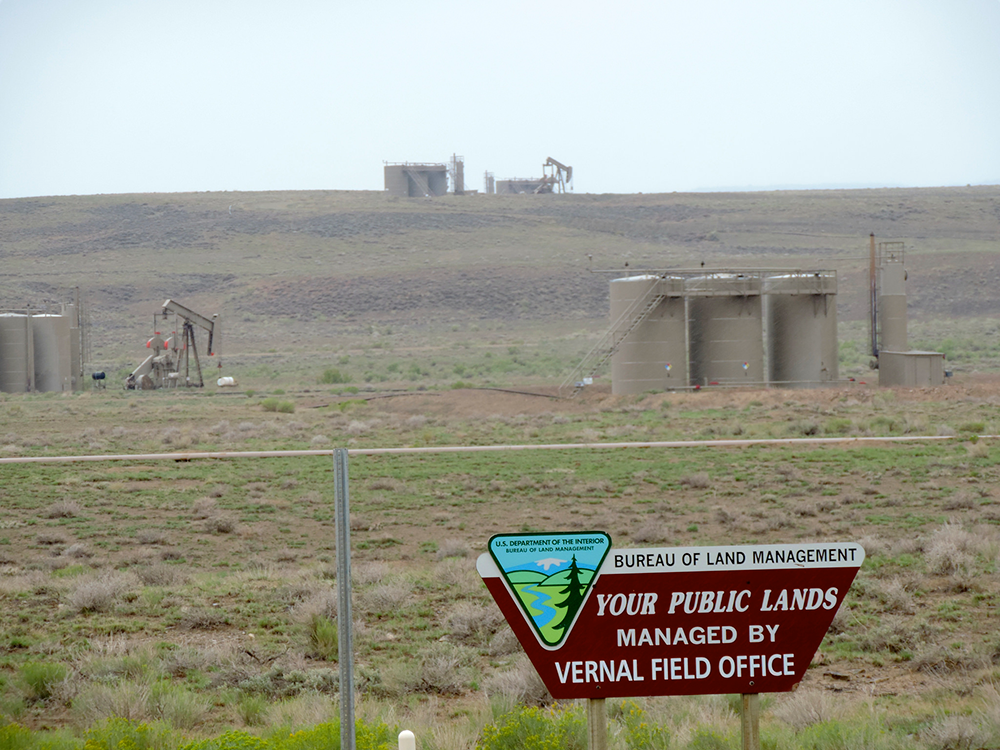New Fracking Rules Protect Groundwater on Federal Lands
Air Date: Week of March 27, 2015

Under the new federal fracking rules, wastewater must be managed onsite and in closed tanks, not open pits seen here. (Photo: Sarah Craig/Faces of Fracking; Flickr CC By-NC-ND 2.0)
Hydraulic Fracturing – fracking – has helped the US become the top producer of oil and gas. Now the Obama administration has announced new rules for fracking on federal lands to help protect groundwater. ProPublica environmental reporter Abrahm Lustgarten tells host Steve Curwood how the rules will help create guidelines for industry practices.
Transcript
CURWOOD: America is now the world’s biggest producer of crude oil and natural gas, thanks to the technology of hydraulic fracturing. Along with profits, so-called fracking has also generated a fair amount of controversy, from concerns about water and air pollution to apparently related earthquakes. There is currently a patchwork of state regulations for fracking, including an outright ban in New York State, and now the federal government has released regulations for fracking on federal lands. Joining us now to discuss the rules is Abrahm Lustgarten, a reporter with ProPublica who covers the energy industry. Welcome back to Living On Earth, Abrahm.
LUSTGARTEN: Thank you. Nice to be here.
CURWOOD: So, these regulations are limited to federal lands. How much of the fracking that’s happening right now is on federal land?
LUSTGARTEN: I think the official statistics are somewhere along 100,000 wells. So that's going to be about 10 percent of the drilling that's happening in the United States. So the most significant place right now is the Bakken Shale. About half, a little less than half of the drilling in the Bakken Shale is on the Fort Berthold Indian reservation. Besides the Bakken, central Wyoming, northern Colorado, parts of California all have very large tracts of federal lands. Tens of thousands of wells and there will be new wells coming in the future, and they will all be subject to these rules.
CURWOOD: So, specifically, what will these regulations do now?
LUSTGARTEN: Well, the regulations essentially update existing regulations, and there are essentially new regulations to protect groundwater from damage that can be caused by the fracking process. So, they're aimed squarely at insuring that wells are constructed well. So they have some requirements for how cement casing will be installed around the structure of an oil or gas well, around how you'll test that cement casing to make sure that it withstands pressure, they’ll do what’s called mechanical integrity tests which are a really important examination to make sure that there can't be any leaks. They'll require a geological analysis of the area around a new well to, in part, determine whether there's fractures or natural fault lines or anything else underground that might allow chemicals or fluids to leak into a surrounding or nearby aquifer. And finally, they'll require that waste temporarily be handled at fracking sites in closed containers, basically in steel tanks instead of the open waste pits that have also been associated with groundwater or pollution across the country.

Fracking on federal lands in the Colorado (Photo: WildEarth Guardians; Flickr CC BY-NC-ND 2.0)
CURWOOD: So, tell me the chemicals that are at risk of getting into groundwater.
LUSTGARTEN: Well, there's a very long list of chemicals that are known to be used in fracking, but there's types of them. There's basically biocides that are meant to kill algae, there's surfactants, which is like a soap that's meant to kind of lubricate the inside of a well, and a couple of other classes of chemicals. And part of the problem is, we don't know what the complete list is, and we don't know that because the oil and gas drilling companies have protected that information as trade secrets. And part of the new rules for BLM lands is requiring oil and gas companies to release that information, or at least a lot of that information.
CURWOOD: How is industry responding to these rules?
LUSTGARTEN: Industry, is, with very familiar refrains, fighting these rules. The American Petroleum Institute immediately filed a lawsuit to stop the rules from taking effect, and the industry across the board has said repeatedly that it will be expensive and onerous and will probably disincentivize investment and drilling on federal lands and lower federal income related to that drilling and so forth. But basically, it seems to be a very thin argument. I've looked a bit at the costs, including the industry's own cost estimates. They're as high as about one and half percent of the cost of drilling a well. The Department of Interior estimates they are as low as one-tenth of one percent the cost of drilling a well. The total cost across the country is estimated to be about $350 million dollars a year. When you consider tens of billions of dollars in profits for each of these companies, it's a very insignificant amount, and at the same time, many of these states actually have state regulations that are as strict or more strict as these new federal rules so, they're already able to comply, they're already assuming the heightened costs of regulations in places in Wyoming on state lands or private lands. And I just don't see these new federal rules as being too much of a roadblock to industry.
CURWOOD: What about the critics of hydraulic fracturing, those environmental activists who focus on energy extraction, what's been their response to the rules?

The Bureau of Land Management (BLM) helps regulate federal land use, including the fossil fuel mining industry. (Photo: WildEarth Guardians; Flickr CC BY-NC-ND 2.0)
LUSTGARTEN: Tepid at best. They, of course, wanted more. Their central criticism is the Obama administration has taken a path towards addressing climate change and that hydrocarbon development should not be allowed on federal lands. They want other requirements as well. They wanted the disclosure of chemicals to come without any sort of caveats without any exemptions for proprietary information, and they want some specific technical details around the well construction requirements described earlier, just things that are incrementally more stringent than what's actually been put in place.
CURWOOD: So, Abrahm, at the end of the day, how important are these new federal rules on fracking?
LUSTGARTEN: Well, it's kind of a mixed bag, but to the extent that federal lands, particularly in the western United States are an important source of oil and gas and will continue to be, this will substantially mitigate the risks that regulators have been seeing and that residents have been seeing in those lands. It sets a baseline for what best practices are acceptable to the federal government; it can be a guide to states. It can be a guide to the companies. There's another important element that I think is kind of significant, and that’s that by requiring significant things it creates a public record, and one of the problems has been years of allegations of environmental contamination from drilling with very little data to check and reference to see how and when a well was drilled as well as what kind of geology it was drilled into and with the advent of these federal rules there will be a public record that can be searched and requested and analyzed and should we have to look back again, there will be a lot more information to work with.
CURWOOD: Abrahm Lustgarten is a Reporter with ProPublica. Thanks so much for taking the time with us today.
LUSTGARTEN: Yeah. Thanks for having me.
Links
New fracking rules on federal lands
“Progress and Controversy Arrive With New Rules for Fracking on Public Lands,” Lustgarten reports.
Disposal of fracking wastewater polluting PA
Living on Earth wants to hear from you!
Living on Earth
62 Calef Highway, Suite 212
Lee, NH 03861
Telephone: 617-287-4121
E-mail: comments@loe.org
Newsletter [Click here]
Donate to Living on Earth!
Living on Earth is an independent media program and relies entirely on contributions from listeners and institutions supporting public service. Please donate now to preserve an independent environmental voice.
NewsletterLiving on Earth offers a weekly delivery of the show's rundown to your mailbox. Sign up for our newsletter today!
 Sailors For The Sea: Be the change you want to sea.
Sailors For The Sea: Be the change you want to sea.
 The Grantham Foundation for the Protection of the Environment: Committed to protecting and improving the health of the global environment.
The Grantham Foundation for the Protection of the Environment: Committed to protecting and improving the health of the global environment.
 Contribute to Living on Earth and receive, as our gift to you, an archival print of one of Mark Seth Lender's extraordinary wildlife photographs. Follow the link to see Mark's current collection of photographs.
Contribute to Living on Earth and receive, as our gift to you, an archival print of one of Mark Seth Lender's extraordinary wildlife photographs. Follow the link to see Mark's current collection of photographs.
 Buy a signed copy of Mark Seth Lender's book Smeagull the Seagull & support Living on Earth
Buy a signed copy of Mark Seth Lender's book Smeagull the Seagull & support Living on Earth

